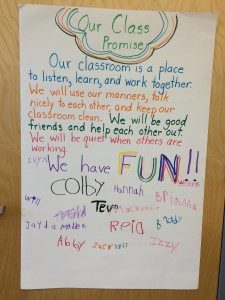What I’m Learning About Student Agency
CompetencyWorks Blog
 On Thursday, December 3 at 7 pm ET the topic of the #NGLCchat series will be on student agency. Guests include Andrew K. Miller, who serves on the National Faculty for the Buck Institute and ASCD; Principal Michele Savage and teacher Casey Montigney from Shue-Medill Middle School in Newark, DE; and Dave Lash and Dr. Grace Belfiore, developers of the MyWays project.
On Thursday, December 3 at 7 pm ET the topic of the #NGLCchat series will be on student agency. Guests include Andrew K. Miller, who serves on the National Faculty for the Buck Institute and ASCD; Principal Michele Savage and teacher Casey Montigney from Shue-Medill Middle School in Newark, DE; and Dave Lash and Dr. Grace Belfiore, developers of the MyWays project.
In preparation for the discussion, I’ve pulled a number of blogs together that touch on student agency. These include blogs written on the topic, how schools are structuring and supporting students to have agency, classroom practices, and my personal reflections as I learn more about it.
A quick summary of my understanding to date (and I mean to date…I’m deep in my own journey of inquiry on student agency and will be writing about it over the coming months):
Student agency is the flip side of personalizing the classroom. Teachers can’t have the flexibility to respond to students in a personalized fashion if they have to provide direction and answer every question.
Student agency, voice, and choice are three different and highly related concepts. Choice is a great thing – however, you can give students choice without necessarily giving them the skills or adequate information needed to make the choices that are in fact going to lead to more learning. Voice is used to express (at least) two different concepts: ability to contribute and shape the environment, and ability to express your opinions based on your personal life experiences and values. The first is often activated through building shared vision and codes of cooperation in each classroom and/or through participation in governance/school operations. The second is critically important for adolescent development and requires a very safe and respectful environment. Agency is about the ability of students to “own” their education. This requires the growth mindset, the skills to manage their learning (habits of work and learning), and transparent structures.
Student agency requires three big changes from teachers. Teachers have tremendous pressures upon them (doesn’t it feel like the entire weight of Congress and the White House is upon them with the state accountability systems and ill-timed teacher evaluation systems?). So they of course want to try to have as much control as they can to get students to work hard. However, they actually have to let go of control in order to get students to take responsibility for their learning. The second thing they have to do is learn how to organize their classrooms to enable student agency. This is an entirely different set of practices, rituals, and cultures than the traditional system. This means teachers themselves have to embrace the growth mindset to take the risk to change practice. Finally, teachers have to be able to find ways for students to get feedback on HOW (habits of work) they learn as well as WHAT (academic standards) they learn.
Laying the foundation for student agency helps everything else fall into place. Those schools that invest in putting down a strong foundation for igniting student agency seem to have more of the spirit of a personalized, competency-based system. There is more joy. There is more engagement. Kids are almost always on task in the classroom – some of them refusing to talk to me because they want to stay focused on their learning. Many schools learn how to do this through the Reinventing Schools Coalition’s Classroom Design and Delivery course. Others take what elementary school teachers know how to do best and bring it into secondary schools. Some create their own ways of doing things based on a deep, deep, deep love and respect for the students (EPIC North and Making Community Connections Charter School come to mind).
Student agency is an awkward phrase. Student agency is a necessary ingredient for a personalized, competency-based system. However, it is almost impossible to use in informal conversations. We need to find a way to express this big idea that makes sense to someone you are chatting with when you are standing in line waiting to order your coffee. Do you think “self-directed” might work?
Here are a number of blogs from CompetencyWorks that touch on student agency:
On Agency
- Student Agency is Not Something You Give or Take
- Learner Agency: The Missing Link
- Three Factors for Success: Agency, Integrated Identity, and Competencies
- Teaching: The Most Intellectual Job in the World
- Climate Change
About How Schools Support Agency
- Chugach School District
- Making Community Connections Charter School (2 parts)
- Casco Bay High School: Tips and Takeaways and The What and HOW of Learning
- Charleston South Carolina: Balancing Competency Education with Student-Centered Culture
- Developing Understanding of Skills and Dispositions
- Finland Offers Lessons for Building Student Agency
Classroom Practices
My Personal Growth in Understanding the Importance of Student Agency
I’d love to hear your thoughts – and are there resources out there that we should be including in our recommended reading. (Check out the wiki for the resources we have collected so far) Are there people that we should include at the iNACOL Symposium who are brilliant in helping us understand student agency and how to enable it?